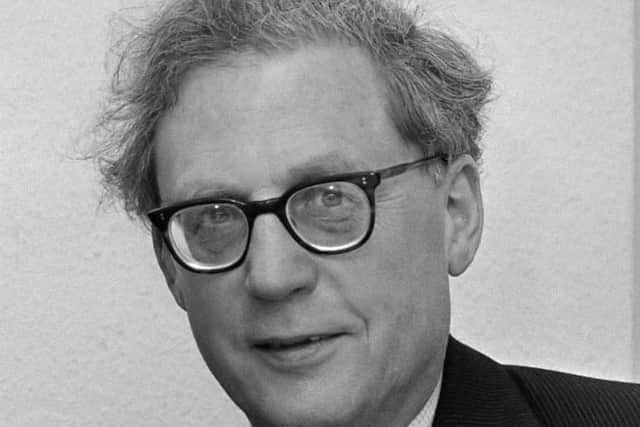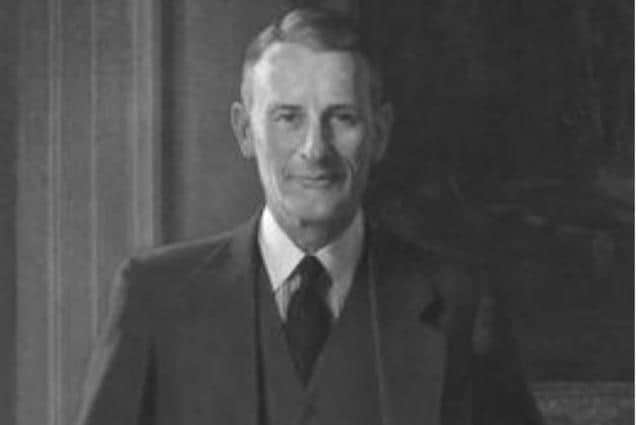Leeds historian explores how UK spies worked against Nazi regime in Second World War
Historian Edward Harrison’s long-standing fascination with the Second World War can be traced back to his school days in Leeds.
Talks then with a number of his Polish classmates sparked an interest in the country’s resistance movement during the conflict, which years later features in Harrison’s latest book.
Advertisement
Hide AdAdvertisement
Hide AdSecret Service Against the Nazi Regime: How Our Spies Dealt with Hitler is a look at Britain’s intelligence-led fight in the struggle with Nazi Germany.


An edited collection of peer-reviewed articles, it is described as telling the human story of survival “with all the drama of power struggles, personality clashes, errors, heroism, [and] human intelligence”.
“For much of the book, I have a strong personal interest in the material, dating from my school days and later from my time at Oxford (University),” Harrison says.
The book’s highlights include examinations of Poland and British policy, as well as a look at the legacy of British security services and the development of the Special Operations Executive (SOE), an underground army that waged a secret war in occupied Europe and aided local resistance movements.
Advertisement
Hide AdAdvertisement
Hide AdReflecting on the former, Harrison says: “It was when I was a boy at St Michael’s College in Leeds that I really became interested in Poland during the Second World. There were quite a few Polish boys there who told me about the Polish resistance and that’s when I became interested in how the Poles fought the Nazis both on the battlefield and in the resistance (movement).


“That material formed the first third of the book. That’s a lifelong interest that really dates back to my Leeds school days.”
Harrison has a personal connection with much of the rest of the book too. It includes material on a number of academics from during his time studying at the University of Oxford.
He knew at the time that the men – his own tutor Charles Stuart, and fellow history tutors Hugh Trevor-Roper and Sir John Masterman – had backgrounds in British intelligence but it wasn’t until years later that he was able to learn more about their activities when documents relating to the secret war effort were released into the National Archives.
Advertisement
Hide AdAdvertisement
Hide Ad“By the mid-1990s, suddenly there was a great deal of material on the British secret war in the archives and to my delight, for the first time, I could actually read about the secret activities of these great men from my Oxford days.
“I could follow their secret trail in the archives which was something completely unexpected. I thought their contribution to the war effort would be secret forever but there it was.
“A later development that was equally important was that their private papers became available too... I was able to blend the public records with detailed private records and much of this material occupies the final third of the book.”
Masterman spent time working with the Security Service – MI5 – and became chairman of the Twenty Committee, which ran the Double-Cross System, controlling double agents in Britain. Spies for Nazi Germany who were captured or had turned themselves in were used by Britain to feed misinformation and deception material back to the Nazis.
Advertisement
Hide AdAdvertisement
Hide AdHarrison, who lives in Leeds, explains the significance of the work. “Eventually they concentrated on feeding material to lead the Germans to believe that the main invasion in France would descend on the Pas-de-Calais (region) not Normandy.
“The deception material convinced Hitler that the landing would come near Calais and the Germans kept armoured divisions there long after the main invasion had begun in Normandy.”
Trevor-Roper and Stuart worked in radio intelligence for the Secret Intelligence Service (SIS) – MI6 – studying messages from Nazi Germany’s secret service to try to learn about the movements of their spies. Wireless signals had to be intercepted, translated and understood.
“Trevor-Roper was a key figure in guiding the interception and in making sense of the wireless messages,” Harrison explains. “It helped British intelligence to build up a picture of the development of the German secret service and its place within the Nazi regime.”
Advertisement
Hide AdAdvertisement
Hide AdThe SIS’s role was to collect secret intelligence from occupied Europe. It had, Harrison explains, a difficult start to the war as the Nazi occupation meant many SIS bases in European countries closed down. It gradually expanded its efforts, greatly helped by its link with Bletchley Park and the codebreaking team there, who penetrated and deciphered secret enemy communications.
“Codebreaking was essential to most of the British intelligence success in the Second World War because we could read the enemy, see what he was planning and getting up to, which is absolutely crucial,” Harrison says. “It was a wonderful trump card.
“MI5 certainly made excellent use of this material. Because we could intercept the wireless messages of the German secret service, we knew when German spies were going to land so they could be collected and offered the alternatives of working for Britain or being shot, which was a fairly straightforward choice for most of them, and then we could use these captured agents to feed deception materials to the Nazis.”
Harrison is a specialist in espionage history, and in Nazi Germany. After obtaining a degree in history at Christ Church, Oxford, he worked as a history researcher in Germany. “My German became good and one of the great advantages I had in this (book) was that I could read any German documents and tie them into the story,” he says.
Advertisement
Hide AdAdvertisement
Hide AdHarrison has another book in the pipeline later this year, which will explore Hitler’s traitors and the resistance within Germany to the Nazi regime. In this book, he considers resistance in occupied Europe, exploring, as mentioned, the contribution by the SOE.
“In particular, (the SOE) contributed to the strengthening of the French resistance so that it could play a big part in sabotage operations to German railways and communications before D-Day, on D-Day and in the days that followed.”
“How much difference SOE made is still highly controversial,” Harrison adds. “It was accused of disrupting British espionage and of course many lives were lost. (But) it certainly caused significant disruption to the Nazi war machine in France and also in other countries.”
As for the impact of British intelligence services? It followed a familiar pattern, he says. “Like the rest of the British war effort, (British intelligence) got off to a slow start and then gradually got into gear and produced some important war-winning successes.”
Secret Service Against the Nazi Regime by Edward Harrison, published by Pen and Sword Military, is out now, priced £25.
